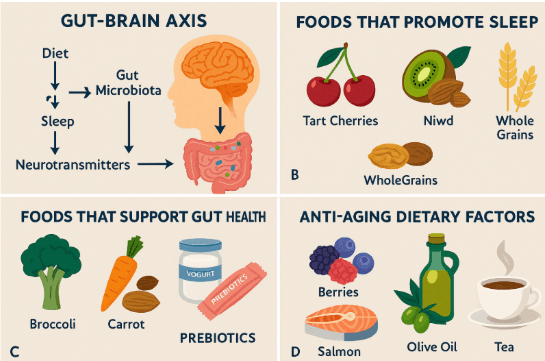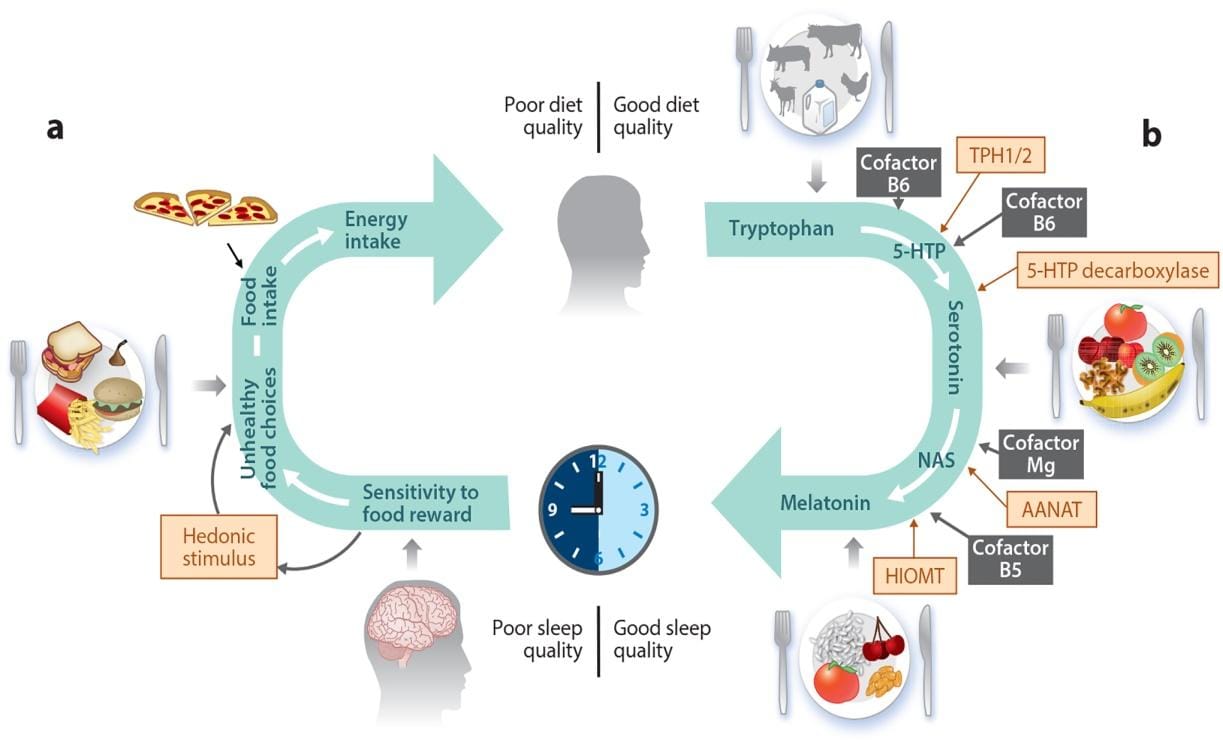The Secret to Healthy Aging? Look at Your Gut, Plate, and Sleep.
Introduction
Our body is a complex ecosystem, which is not only fuelled by food, but also shaped by how trillions of gut microbes perceive what we eat, how sleep hormones are regulated, and how we age. Rather than treating diet, sleep quality, gut microbiota balance, and aging as separate factors, one should look into them holistically, as they are all interconnected on numerous levels through a web of biochemistry. In this framework, we will analyse how certain foods create a positive chain reaction by nourishing gut microbes that produce metabolites that support sleep, which in turn promote restorative slumber, dampen inflammation, and slow down the aging process.

Figure 01: How diet influences the gut–brain axis and highlights key foods for sleep support, gut health, and healthy aging.
Dietary Substrates Shaping the Microbiome
Dietary fibres, polyphenols, and amino acids can be recognized as the building blocks for gut bacteria since each nutrient promotes the growth of specific microbial populations. For example, fermentable fibres such as inulin and resistant starches increase the number of Faecalibacterium prausnitzii and Roseburia spp. These bacteria synthesize short-chain fatty acids such as butyrate and propionate . Butyrate enhances the intestinal barrier by up-regulating tight-junction protein expression and decreasing systemic endotoxin translocation, thereby decreasing low-grade inflammation related to aging. Polyphenols from berries and olive oil are transformed into anti-inflammatory phenolic acids, which strengthen the gut barrier integrity . On the other hand, dietary tryptophan is metabolized by bacteria to indole derivatives and precursors of serotonin, setting the stage for optimal neurotransmission via the gut–brain axis .
Microbial Metabolites and Sleep Regulation
Microbial metabolites impact sleep through at least three connected pathways. First, certain gut bacteria synthesize and release neurotransmitter-like molecules (such as serotonin [5-HT] and histamine) that operate along the hypothalamic–pituitary–adrenal axis that regulates the sleep–wake cycle. Second, microbial metabolites (e.g., peptidoglycans and short-chain fatty acids) engage gut-associated immune cells (including dendritic cells, T cells, and macrophages) to alter systemic cytokine profiles (such as IL-10 and IL-6) that can induce or impair sleep homeostasis. Third, microbial metabolites influence the circadian rhythm by regulating the expression of clock genes (comprising Clock and Bmal1) in intestinal epithelial and immune cells. These help in the maintenance of barrier function, synchronization of the host circadian rhythms, and enhancement of sleep quality.
Together, these pathways demonstrate the importance of gut microbiome in modulating the expressions of neuroendocrine and immune cells along with the circadian cycle. Therefore, manipulation of gut microbiome and supplementation of probiotics can be an alternative to treat sleep disorders.
Sleep’s Impact on Gut Microbial Balance
Sleep in itself is an important regulator of the gut microbiome. In a randomized crossover trial involving nine healthy young adults, sleep deprivation on two consecutive nights (4 h time in bed per night) with standardized diet showed no difference in overall metabolic parameters, however, there was a shift in gut microbial composition (i.e. increase in Firmicutes [Ruminococcaceae, Lachnospiraceae] and a decrease in Bacteroidetes ). These results suggest that even short-duration sleep loss can subtly change the microbial balance before affecting the metabolic parameters.
Quality sleep enhances the synchronization of rhythmic clocks, regulates the timing of enzyme secretion, and the production of antimicrobial peptides that control the growth of pathogens. However, chronic sleep disruption increases cortisol and inflammatory cytokines, especially IL-6 and TNF-α, leading to a decrease in the diversity of the beneficial microbes, lower short-chain fatty acids (SCFA) levels, and elevating certain inflammatory markers . This type of imbalance not only disrupts sleep quality but also contributes to systemic inflammation, accelerating the aging process.
Are you getting enough sleep? Let your gut bacteria reveal the truth about your sleep cycle. With ‘QualitySleep’, you’re in for the dream deal with us!
Inflammaging : Connecting Inflammation to Cellular Aging
The term "inflammaging" refers to chronic, low-grade inflammation associated with aging. This condition connects poor sleep and gut dysbiosis with cellular aging. Elevated levels of proinflammatory cytokines can lead to greater oxidative damage to DNA and telomeres, thus further limiting the replicative potential of somatic cells, hence accelerating cellular aging . Conversely, diets rich in free radical scavengers, such as tea, which can also inhibit NF-κB signalling, delay the process of cellular senescence . Furthermore, polyphenols found in extra virgin olive oil may exhibit stimulation of the longevity enzyme sirtuin-1 (SIRT1), which increases cellular repair pathways . Nutrition thus plays an important role in managing the inflammation-sleep-gut triangle, therefore mitigating cellular aging.
Practical Dietary Strategies for a Harmonized Gut–Sleep–Aging Axis:
Translating these insights into practice does not demand strict dietary meal plans but rather focuses on nutrition patterns that support this interconnected web. Eating a variety of fermentable fibres, including oats, legumes, and some root vegetables, guarantees a continuous flow of SCFA . The intake of fermented foods, particularly yogurt and kefir, containing live Lactobacillus and Bifidobacterium strains improves barrier function and tryptophan metabolism . Tryptophan-rich seeds and nuts like almonds and pumpkin seeds are primary constituents for serotonin and melatonin production . Oily fish is a source of anti-inflammatory omega-3s, which, alongside antioxidant-rich fruits and teas, help to reduce oxidative stress and support both brain and gut health.

Figure 02: Illustrating how poor versus good diet quality modulates gut–brain signalling and the tryptophan–serotonin–melatonin pathway to influence sleep quality and energy intake
Source:https://doi.org/10.1146/annurev-nutr-120420-021719
Conclusion: Cultivating a Positive Feedback Loop
In conclusion, diet, gut health, sleep, and aging do not occur in isolation, but rather as interlocked components in a biological conversation. When we make food choices to support healthy microbes we create a positive feedback loop that supplies sleep-promoting metabolites and anti-inflammatory molecules which promotes overall health. A balanced microbiome yields better restorative sleep, which also reduces "inflammaging." In the long term, this integrated approach will not only encourage healthy cellular aging but also improve the quality of life.
-Abhishek Lakshmipathy
References
- Roberfroid, M., Gibson, G. R., Hoyles, L., McCartney, A. L., Rastall, R., Rowland, I., Wolvers, D., Watzl, B., Szajewska, H., Stahl, B., Guarner, F., Respondek, F., Whelan, K., Coxam, V., Davicco, M., Léotoing, L., Wittrant, Y., Delzenne, N. M., Cani, P. D., . . . Meheust, A. (2010). Prebiotic effects: metabolic and health benefits. British Journal of Nutrition, 104(S2), S1–S63. https://doi.org/10.1017/s0007114510003363
- Cardona, F., Andrés-Lacueva, C., Tulipani, S., Tinahones, F. J., & Queipo-Ortuño, M. I. (2013). Benefits of polyphenols on gut microbiota and implications in human health. The Journal of Nutritional Biochemistry, 24(8), 1415–1422. https://doi.org/10.1016/j.jnutbio.2013.05.001
- Gao, K., Mu, C., Farzi, A., & Zhu, W. (2019). Tryptophan metabolism: a link between the gut microbiota and brain. Advances in Nutrition, 11(3), 709–723. https://doi.org/10.1093/advances/nmz127
- Lin, Z., Jiang, T., Chen, M., Ji, X., & Wang, Y. (2024). Gut microbiota and sleep: Interaction mechanisms and therapeutic prospects. Open Life Sciences, 19(1). https://doi.org/10.1515/biol-2022-0910
- Jenkins, T., Nguyen, J., Polglaze, K., & Bertrand, P. (2016). Influence of Tryptophan and Serotonin on Mood and Cognition with a Possible Role of the Gut-Brain Axis. Nutrients, 8(1), 56. https://doi.org/10.3390/nu8010056
- Benedict, C., Vogel, H., Jonas, W., Woting, A., Blaut, M., Schürmann, A., & Cedernaes, J. (2016). Gut microbiota and glucometabolic alterations in response to recurrent partial sleep deprivation in normal-weight young individuals. Molecular Metabolism, 5(12), 1175–1186. https://doi.org/10.1016/j.molmet.2016.10.003
- Voigt, R. M., Forsyth, C. B., & Keshavarzian, A. (2013). Circadian disruption: potential implications in inflammatory and metabolic diseases associated with alcohol. https://pmc.ncbi.nlm.nih.gov/articles/PMC3860420/
- Li, Y., Zhang, B., Zhou, Y., Wang, D., Liu, X., Li, L., Wang, T., Zhang, Y., Jiang, M., Tang, H., Amsel, L. V., Fan, F., & Hoven, C. W. (2020). <p>Gut Microbiota Changes and Their Relationship with Inflammation in Patients with Acute and Chronic Insomnia</p> Nature and Science of Sleep, Volume 12, 895–905. https://doi.org/10.2147/nss.s271927
- López-Otín, C., Blasco, M. A., Partridge, L., Serrano, M., & Kroemer, G. (2013). The hallmarks of aging. Cell, 153(6), 1194–1217. https://doi.org/10.1016/j.cell.2013.05.039
- Boots, A. W., Haenen, G. R., & Bast, A. (2008). Health effects of quercetin: From antioxidant to nutraceutical. European Journal of Pharmacology, 585(2–3), 325–337. https://doi.org/10.1016/j.ejphar.2008.03.008
- Grosso, G., Galvano, F., Marventano, S., Malaguarnera, M., Bucolo, C., Drago, F., & Caraci, F. (2014). Omega-3 fatty acids and depression: scientific evidence and biological mechanisms. Oxidative Medicine and Cellular Longevity, 2014, 1–16. https://doi.org/10.1155/2014/313570
- Menendez, J. A., Joven, J., Aragonès, G., Barrajón-Catalán, E., Beltrán-Debón, R., Borrás-Linares, I., Camps, J., Corominas-Faja, B., Cufí, S., Fernández-Arroyo, S., Garcia-Heredia, A., Hernández-Aguilera, A., Herranz-López, M., Jiménez-Sánchez, C., López-Bonet, E., Lozano-Sánchez, J., Luciano-Mateo, F., Martin-Castillo, B., Martin-Paredero, V., . . . Segura-Carretero, A. (2013). Xenohormetic and anti-aging activity of secoiridoid polyphenols present in extra virgin olive oil. Cell Cycle, 12(4), 555–578. https://doi.org/10.4161/cc.23756
- Pyo, Y., Kwon, K. H., & Jung, Y. J. (2024). Probiotic functions in fermented foods: Anti-Viral, immunomodulatory, and Anti-Cancer benefits. Foods, 13(15), 2386. https://doi.org/10.3390/foods13152386
- Zuraikat, F. M., Wood, R. A., Barragán, R., & St-Onge, M. (2021). Sleep and Diet: Mounting evidence of a cyclical relationship. Annual Review of Nutrition, 41(1), 309–332. https://doi.org/10.1146/annurev-nutr-120420-021719